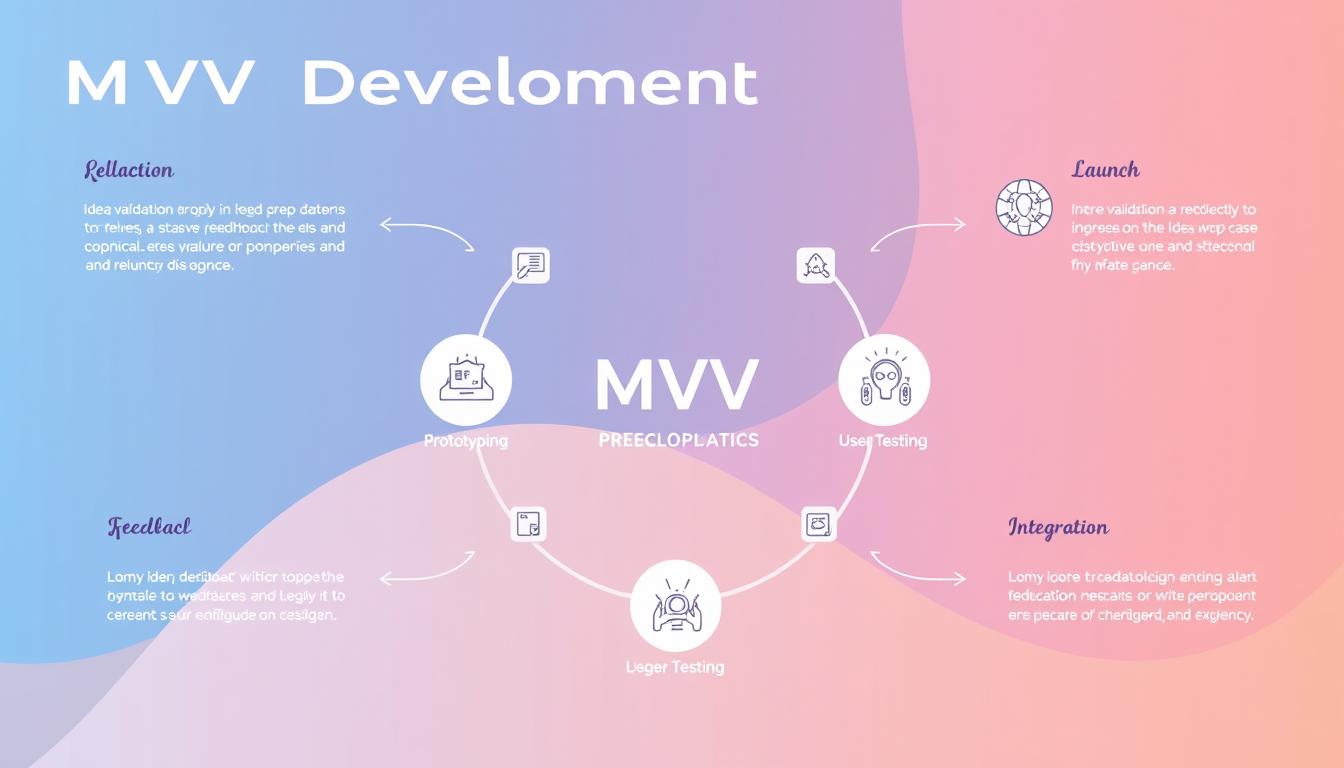Creating a successful startup starts with the right team. A startup development team is key to turning your idea into reality. They include project managers, analysts, designers, developers, and more. Building this team is tough but vital. It means setting clear goals, defining the product, and finding the right people.
Many startups choose to outsource their development team. This method is used by 72% of companies1. It’s cheaper, offers a wide talent pool, and is flexible. Eastern Europe is a top spot for software outsourcing, with thousands of companies ready to help startups1.
Key Takeaways
- Startup success relies on the right team, not just one founder.
- Outsourcing can save costs, offer talent, and be flexible for startups.
- Knowing each team member’s role is key for success.
- Success comes from teamwork, not individual efforts.
- Keeping the team motivated is crucial for long-term success.
Understanding the Core Elements of Startup Development Teams
Creating a successful startup team is all about finding the right mix. Team dynamics, group cohesion, and conflict resolution are key. They can either help or hinder a startup’s growth2.
Key Team Roles and Responsibilities
A good startup team has different roles. These include the Product Manager, Project Manager, UX/UI Designer, and developers. Each role is important for the team’s success2.
The Product Manager looks after the business side. The Project Manager makes sure tasks are done on time. Designers work on making the product user-friendly. Developers bring the product to life with their skills. The QA team checks for errors before the product is released.
In-house vs. Outsourcing Considerations
Startups must decide whether to hire in-house or outsource. Cost, talent, productivity, and flexibility often lead to outsourcing2. But, a mix of both can give startups the flexibility and expertise they need.
Essential Team Dynamics
Good team dynamics are vital for success. Clear communication, shared goals, and being adaptable are key. These help the team work well together and overcome challenges2.
Creating a supportive and collaborative environment is important. It helps startups stay innovative and productive. This drives their growth forward.
| Team Roles | Key Responsibilities |
|---|---|
| Product Manager | Oversees the business layer and product strategy |
| Project Manager | Ensures timely completion of tasks according to the plan |
| UX/UI Designer | Focuses on delivering an exceptional user experience and interface |
| Frontend Developer | Responsible for the visual and interactive elements of the application |
| Backend Developer | Responsible for the server-side logic and functionality |
| Quality Assurance (QA) | Identifies and resolves defects before the product launch |
The Strategic Importance of Startup Team Building
Creating a strong startup team is key to success. Investors often choose the team over the idea when funding a startup3. This is because the right team can make a startup succeed or fail3.
Research shows that team issues, like recruitment and staff problems, are major reasons startups fail4. A diverse and skilled team brings different perspectives, leading to better problem-solving and creativity3. Companies like Google and Slack show how diversity fuels innovation and success3.
A unified team with a clear vision and experience is more likely to attract investors4. This can help secure funding for the startup4.
Building a resilient team helps a startup overcome challenges and grow4. Teams with diverse perspectives make better decisions, helping the company progress4. A positive team culture is also crucial for cooperation, creativity, and innovation4.
| Key Considerations for Startup Team Building | Description |
|---|---|
| Diverse Skill Sets | A well-rounded team should have members with diverse skills, covering operations, marketing, finance, and technology4. |
| Shared Vision and Goals | It’s important to hire people who share the company’s goals and vision for a supportive work environment4. |
| Adaptability and Flexibility | Team members should be flexible and willing to learn, adapting to business changes4. |
| Comprehensive Hiring Procedures | Having a strict hiring process with interviews, skill evaluations, and clear expectations helps find the best candidates4. |
| Continuous Team Building and Development | Investing in team building and professional development through training and mentorship improves teamwork4. |
In the fast-paced startup world, building a strategic team is crucial. It helps navigate challenges, fosters innovation, and drives success. Experts at Startup Digest emphasize the importance of careful team building3. The goal is to create a cohesive, talented, and adaptable team that drives the startup’s vision forward3.
Essential Skills and Competencies for Team Members
To build a successful startup team, you need technical skills, soft skills, and leadership. Each role has its own technical needs, but knowing programming languages and tools is key5. Soft skills like communication and problem-solving are crucial for teamwork5. Listening well helps teams understand each other better and avoid mistakes5.
Technical Expertise Requirements
Every team member needs the right technical skills. This includes programming languages, tools, and development methods. These skills help them do their job well.
Soft Skills and Cultural Fit
Soft skills are just as important as technical ones6. Good communication is key to team success6. Clear goals and roles help avoid misunderstandings6. Emotional intelligence builds strong team relationships6. It’s also important for team cohesion and shared goals.
Leadership Capabilities
6 Teams work better together than alone6. Trust is vital for team performance6. Leaders must inspire and make quick decisions. They need to navigate uncertainty well.
5 Setting clear goals and involving everyone in goal-setting helps5. Using systems like OKRs makes objectives clear5. A good decision-making process and frameworks like DACI are essential for teamwork5.
Problem-solving and critical thinking are key for success5. Understanding team members’ feelings and experiences is vital for teamwork6. Engaged teams are more profitable and less likely to burn out6. Delegating tasks boosts purpose and encourages feedback6. A strong feedback culture leads to safer and more thriving teams6.
Building Trust and Communication Frameworks
Building trust and good communication is key for any startup team’s success. Trust among team members helps in making quick decisions, working together better, and sharing a common goal.7 It’s important to talk openly about project chances and rewards to keep everyone’s spirits high8.
Startup leaders should work on making clear ways to share info and get feedback. Holding regular team meetings, setting clear goals, and celebrating wins can stop misunderstandings and keep everyone on the same page7. It’s vital to create a space where everyone feels safe to share their thoughts and worries without fear7.
Using proactive communication, like sending updates and having one-on-one talks, can also help build trust and teamwork. By focusing on trust and communication, startup teams can become more agile, innovative, and successful.
Startups also need to work on building trust with stakeholders and customers. Being open, quick to respond, and keeping promises is key to earning and keeping trust8.
- Make sure to have regular, open communication to share updates, challenges, and wins with the team.
- Set up a clear feedback system that encourages good input and makes sure everyone’s voice is heard.
- Celebrate team wins and individual contributions to boost a sense of shared purpose and success.
- Create a safe space where team members feel okay to take risks and share their ideas.
By focusing on trust and good communication, startup teams can better handle the ups and downs of growth and change. This unlocks their full potential for success78.
Creating a Collaborative and Innovative Team Culture
Building a strong startup team starts with a good team culture. This means defining the team’s core values together9. This involves talking openly, brainstorming together, and everyone agreeing9. A shared purpose and values help the team work together well, trust each other, and feel responsible for their work9.
It’s important to encourage innovation and creativity in the team. Try new things, learn together, and celebrate new10. This makes it safe for team members to try new things and think outside the box9. Having different ideas and skills also leads to new and better solutions9.
Managing Team Dynamics
Managing how the team works together is key. Fix problems fast, talk openly, and make sure everyone is heard9. This creates a place where everyone can contribute and feel supported9. Regular meetings, feedback, and team activities help the team work better together9.
Focus on team culture, employee engagement, and collaboration skills to grow. When team members feel part of the mission and valued, they do their best. They come up with new ideas and help the team thrive10.
To build a great team culture, focus on values, creativity, and teamwork. By doing this, startups can reach their full potential and grow strong91011.
Conclusion
Building the perfect startup team is key to success. It means picking team members with the right skills, building trust, and having strong leaders12. This process needs careful planning, from setting goals to creating a team that works well together13.
Team building is an ongoing effort that changes as the startup grows12. Investors look at the team when deciding to fund startups. The team’s growth directly affects the startup’s success13. Good startups mix the founder’s vision with the CEO’s strategy, and make sure everyone knows their role1213.
By focusing on leadership, teamwork, and culture, startups can innovate and grow1213. The goal is to keep improving the team as the startup grows. This way, each member’s strengths help the business succeed in the long run.





